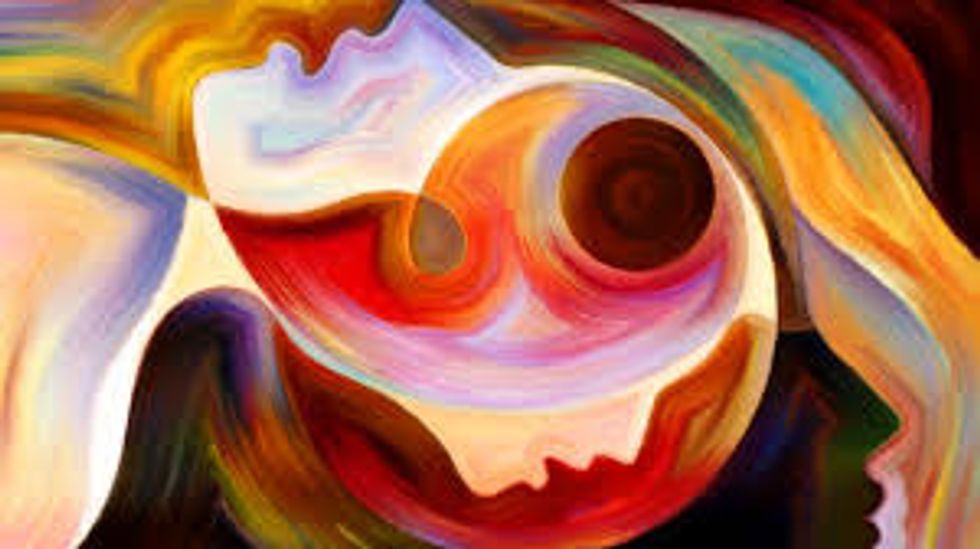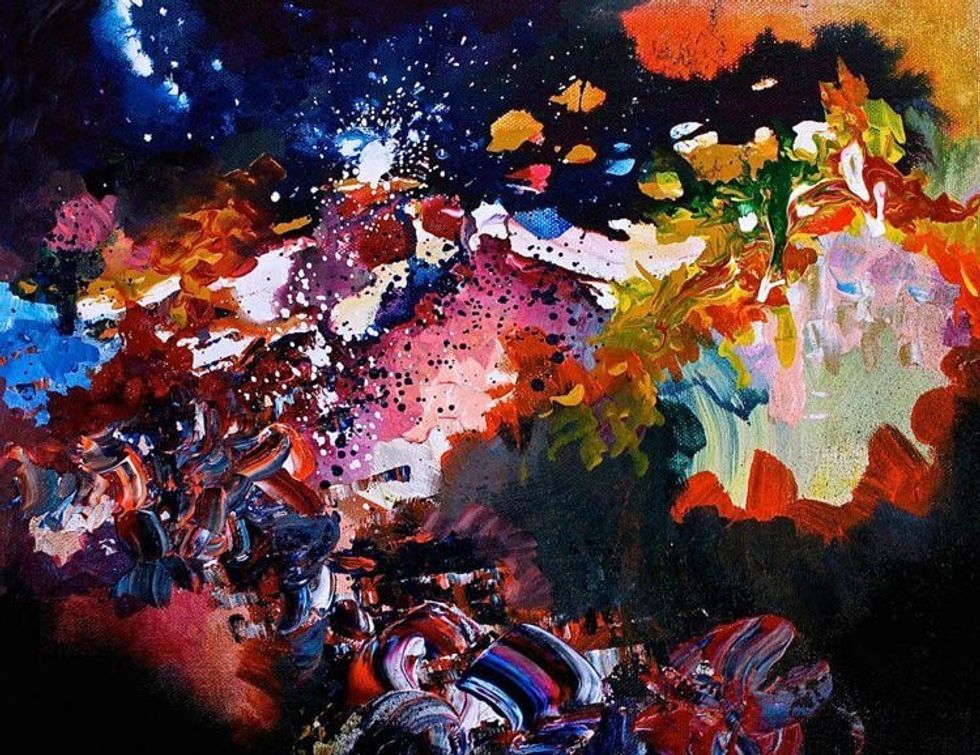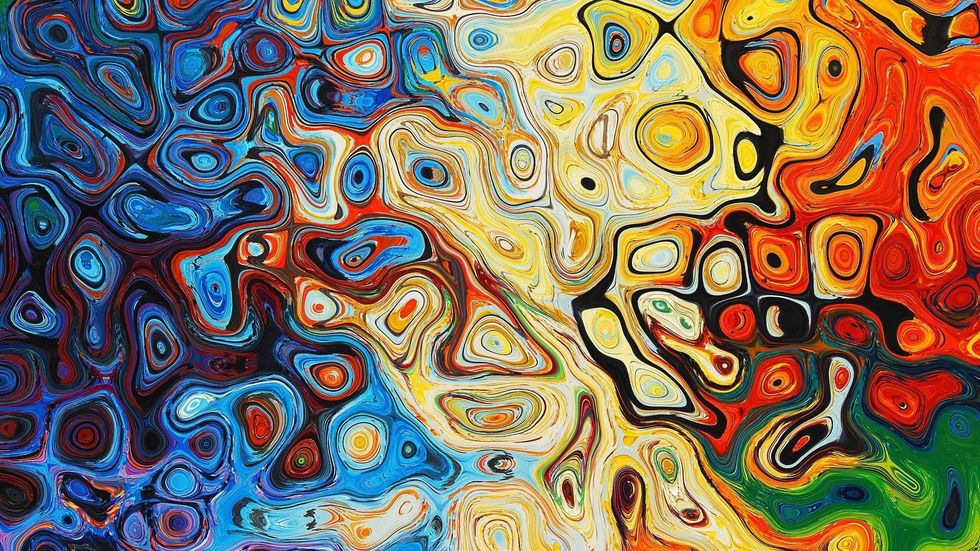My senior year of high-school I sat in a group of six, assigned to analyze a poem that had been read as a class. As my group shared their ideas of the hidden meanings within the lines of the poem I realized when it came my time to share, I would be embarrassed. English and literature were my favorite subjects throughout secondary school, it came easy to me and I loved the opportunity to be abstract with my interpretations, unlike other classes. However, I was never the student to raise my hand and share my opinions, they remained with me.
This was because, my thoughts were difficult to verbalize. When I read it was with color, texture, and emotions; making it difficult to translate daily thoughts into coherent sentences. When I spoke, there was an overwhelming amount of fillers, "you know what I mean" and "thingy" were common placeholders never to be filled. I was jealous of those who could speak their thoughts with ease, share ideas without using their hands as an aid, or struggle to remember the point. I excelled in creative writing, but when it came to having a clear argument, I always fell short. The same advice was always scribbled on the front page of my papers, "your point is unclear." I tried to better myself with each assignment, but couldn't understand how those around me were translating the colors and textures so. much. better. Until one day, my mother approached me about something she had read on the internet. "Have you ever heard of Synesthesia?"

Synesthesia is defined as, "a perceptual phenomenon in which stimulation of one sensory or cognitive pathway leads to automatic, involuntary experiences in a second sensory or cognitive pathway." or "a union of the senses."
When first exposed to this information, I was completely in denial. Until that moment, I was unaware that people weren't thinking as I was; but that I was unique. I refused to think this "neurological condition" applied to me, or that I could be different. I asked everyone I knew what they tasted when hearing certain words, and what colors they saw during certain songs, and it only made me feel more isolated. My time became dedicated to the research and discovery of what this meant and why it made me who I am. Obsessed, I spent entire school days searching and reading the mechanisms, research, and possible diagnoses of this foreign "phenomenon" which could define so much of who I am. Then I discovered the three forms that made up the workings of my thoughts, perceptions, and feelings.
Synesthetic associations can occur in any combination and any number of senses or cognitive pathways.
Synesthesia - Wikipedia
Chromesthesia
When I lay in bed and hear the sound of snow hitting the roof above me, it triggers a visual of fluid colors that swirl and breathe like a projection from my mind. Music can elicit strong, sometimes overwhelming, visuals that vary in shape, color, and intensity from song to song. The popping of a cork can send bursting colors out into the space around me making the mood that much more visceral. This is one form of my synesthesia. Chromesthesia is the name of the specific experience of sound to color, shape, and for me, even texture.
It may sound like a fun never ending LSD experience without the danger of a bad trip, however, I find it can be terribly overwhelming. In crowds I feel drained and disoriented, fighting to make sense of the surrounding conversations while fighting to ignore the sensory overload. Music, conversations, the snacking of food, it can all be too much. I struggle to focus, be present, and often find myself dissociating to avoid the headache of sifting through the surging colors in my mind.
But, it has allowed to me feel more than I ever have. When I paint, I play music and allow the involuntary visions to make up the contents of the canvas. When I write, I practice translating my colors into words, every once in a while, proud of what's written on the page. My mind allows my creativity to function of a plane deeper than most. I feel it all much more violently. Simple violin concertos can bring tears to my eyes, and the buzz of an electric song can paralyze me, sending me into a sensory stupor.
Lexical-Gustatory
When I dry my hair, like most straight-haired girls, I use a towel. When I hear the word towel, champagne floods into my mouth. The bubbles tingle and roll across my tongue and I swallow it up while I feel the fuzzy fabric of the towel in my hands. This is not literal. I'm not sneaking champagne during my showers, but the experience of tasting it is just as real as if I was. My brother's name is a flaky pastry, crisp with hints of nutty chocolate. My second form of synesthesia. Lexical-Gustatory is the experience of taste when hearing words.
Words with positive association taste good and negative taste bad. My favorite swear taste like asparagus and love tastes like popcorn. Winter is my favorite word, a strange combination of lilac and mint flood my tastes buds and if the word is related to a particular food, I can salivate. Like the previous, this can often cause me to feel overwhelmed in large groups or when apart of multiple different conversations. If this phenomenon I experience is brought up by a friend, I am suddenly bombarded with questions, "what does my name taste like", "tell me what this word tastes like", "can you choose the flavor?"
I cannot control it, and I don't necessarily enjoy it. Most days I go on without much notice, but when asked it can be difficult to put into words what exactly I'm tasting, as nothing can ever be simple. Food tastes like itself and yes colors have taste. This form only adds to the complexity of my senses, making music and sound a whole body experience.

Mirror-Touch
Outside an ice skating rink I sat with a large group of friends, our volume and moods at an all time high. The weekend was starting and it was close to being summer vacation. We talked, laughed, and stuffed our faces with food. Suddenly, I felt a warm wave wash over me. I was not only sad, I had the overwhelming sensation of sobbing. My chest felt heavy and my hands became clammy. When I turned to leave the group, I noticed a girl and felt that in that moment, we were the same. I approached her, asking if she was alright. Wide eyed she began to shake and the tears slipped from her eyes.
Mirror-Touch is my third form of synesthesia. When someone experiences a sensation I involuntarily feel it as well. Headaches, a tap on the shoulder, and pinching a like will affect me as they affect you. My feelings are heightened, and the echoes of pain, touch sensation, and emotion flood into me on daily basis.
People with this type of synesthesia have been shown to have higher empathy levels compared to the general population.
Synesthesia - Wikipedia
I cry easily, have a low threshold for pain, and experience emotional imbalances no matter the location. I feel as though I am connected to everyone around me. Injustices online are met with a heartbreak as though I am the victim, victories of the underdog are injected into me, the dopamine keeping me high for days. Your pain is my pain. Your joy is my joy. I can read the room and can always tell when being lied to. Your feelings flood into me and when I am alone, I can feel empty. Hollow.

I don't feel this makes me special, and for the most part I keep it to myself. However, I think it's important to understand the inner workings of ourselves if we ever want to be happy with who we are. We live in a society where it can be so difficult to love our bodies, our minds, and our spirits. So many of us only see ourselves as depressed, anxious, unhappy, or without likable qualities. It's sad, untrue, and I feel that sharing something I find so ugly and unimpressive can allow me to see it as an outsider. I've been told my synesthesia is a gift, when I've only ever seen it as a speed bump. But through sharing it slowly with those around me, I can learn to appreciate the rare quality within me, as everyone should. I do not think like everyone. I do not paint like everyone, and I do not interpret life like everyone. But who really does?
We all have gifts. Whether we know of them yet or not. We are all special. Our senses allow us this. We all walk, run, talk, laugh, and love differently. Thats why poetry is so impressionistic. It is a reflection of ourselves, and none of us are the same. This does not mean I am cured of the insecurities I face, or the embarrassment I felt in my group of six when trying to explain why the word popcorn had slipped from my mouth when giving my thoughts of the poem. We do not suddenly love the parts of us we find ugly. But when we find ourselves envious over the qualities of another, this is when we forget that someone else may be envious of our own.



 Photo by
Photo by  Photo by
Photo by  Photo by
Photo by 



















